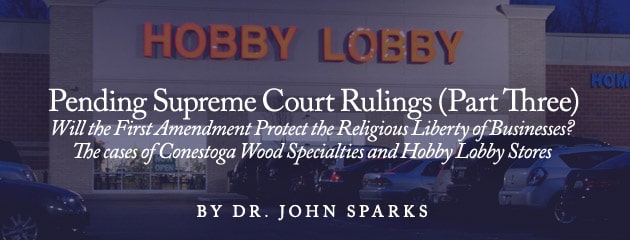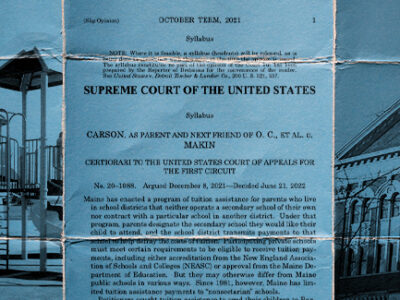
Conestoga Wood Specialties is a wood cabinets business located in Lancaster County, Pa. It is organized as a for-profit corporation and the voting shares are owned by members of a single family—the Hahns. They are Mennonite Christians. Conestoga has approximately 1,000 employees. It is the application of the Affordable Care Act (ACA) to this small firm and its owners that has brought this case to the U.S. Supreme Court as well as a companion case which involves the owners (the Greens) of a corporation known as Hobby Lobby. Hobby Lobby Stores, Inc. has 16,000 full-time employees and operates 550 stores nationwide.
What exactly is the issue?
The ACA—Obamacare— and the Health and Human Services regulations issued to implement the law, contain what has been called a “contraception mandate” as part of the health insurance that employers must provide to their employees. To refuse to do so results in a heavy fine. Among the types of contraceptive drugs or devices included are four which prevent an already fertilized egg from being implanted in the woman’s uterus. Both the Hahn family of Conestoga Wood Specialties and the Green family of Hobby Lobby hold religious convictions that regard the use of such contraceptives as aborting a new human life. They are both pro-life.
The question of whether or not Conestoga and Hobby Lobby should be freed from the ACA requirements on religious grounds is likely to be answered by the court’s interpretation of the Religious Freedom Restoration Act (RFRA), which Congress passed in 1993. That Act, along with the First Amendment free exercise clause (“Congress shall make no law…prohibiting the free exercise of religion”), offer protection for citizens whose religious convictions conflict with government mandates.
The RFRA requires the Supreme Court to use a particular approach to religious liberty cases involving the federal government. Lawyers call this approach the Sherbert test because it was first used by the Supreme Court in the case of Sherbert v. Vernor (1963). This test requires the court to make three determinations. The justices must first decide if the federal contraceptive mandate imposes a “substantial burden” on the complaining party’s free exercise of religion. If it does, then the court must assess whether the federal government, nevertheless, has a “compelling interest” or reason for the burden. Finally, the court must consider whether some other action, less restrictive of religious liberty, could have been used instead.
Under the RFRA and the Sherbert test, there is little doubt that the contraception mandate of the ACA puts a substantial burden on the religious exercise of the Hahns and the Greens in each of their enterprises. The fine for violating the contraceptive mandate is $100 per day, per employee. That would mean a fine of approximately $100,000 per day for Conestoga Wood Specialties, for example. If Conestoga simply dropped its health plan, it would incur a fine equal to $1.9 million annually. In Hobby Lobby’s case, because it is larger, the fine per day would total $1.6 million and the fine for dropping its health plan would be around $26 million. Refusing to comply with the ACA mandate is a choice that would mean financial ruin to the two businesses. However, complying with the ACA mandate will put the Hahns and the Greens in the position of being complicit with the taking of human life, which is clearly condemned by their religious traditions. The substantial burden imposed upon them by the government is undeniable.
Continuing the Sherbert test, does the federal government have a compelling interest in forcing these two business families into such a moral predicament? Decidedly not. The Obama administration has already granted exemptions to a large number of non-profit religious institutions, grandfathered in existing plans without this mandate, excluded small employers from providing health care plans, and exempted health care sharing ministries. Therefore, the Obama administration’s own elasticity with regard to the “mandate” precludes it from arguing that the contraception requirement is absolutely necessary to the well-being of its citizens. As for other means of providing free contraception to women, the government already has in place programs which do not require persons with religious convictions to participate.
But the federal government comes after these businesses and their owners from another angle, one that is ominous for all business owners who practice their faith in the conduct of their business. The federal government claims that the free exercise of religion and the RFRA do not apply to the Hahns and the Greens because they are doing business in the corporate form. The government asserts that business corporations—Conestoga Wood Specialties and Hobby Lobby—do not have protected religious liberty rights. Religious liberty, claim Sebelius and company, is only for individual persons, not corporate persons.
This assertion is clearly wrong in three ways.
First, the RFRA says that the “government shall not substantially burden a person’s exercise of religion… .” The meaning of the word “person” includes, of course, natural persons, but according to the U.S. Code, when the word “person” is used in a federal law, it also includes “corporations, companies, associations, firms, partnerships, societies, and joint stock companies.” Simple statutory interpretation of the RFRA shows that corporations were meant to be covered by its provisions protecting religious liberty.
Second, the Supreme Court has recognized the constitutional rights of corporations in many other cases. As the brief for Hobby Lobby summarizes, “corporations have long been treated as ‘persons’ under the Equal Protection Clause, the Due Process Clause … and recognized as capable of exercising rights under the First, Fourth, Fifth, Sixth, Seventh, and Eighth Amendments.” The most recent case that achieved a great deal of public attention was Citizens United v. the Federal Election Commission (2010), in which the Supreme Court said that First Amendment protections extend to corporations, non-profit, and for-profit alike.
Third, as those who practice law know, the reason that many family enterprises incorporate is for the protection incorporation gives their personal family assets, such as a home and personal investments, limiting their liability to what they put into the business. In fact, there are more than 4,000,000 corporations organized like Conestoga and Hobby Lobby in the U.S. today. So, while there is a type of separation for liability purposes, what the corporation does or does not do is a testimony to the principles, including religious principles, held to by the owners. As the brief for the Hahns so clearly puts it, “Whatever the legal status of their organizations, owners and operators do not check their beliefs at the door each Monday morning. They live their faith throughout the work week. Hence it is the Hahns’ religious beliefs that prevent Conestoga from providing drugs and devices that end a newly-formed human life. There is no separating the two.”
In this highly-secularized age, some may find it hard to believe that religious faith like that of the Hahns and the Greens actually directs the whole of their lives including their business dealings. But, if religious liberty is to be maintained, these families and many others like them must be allowed to exercise their faith free from governmental fiats and threats.





Pingback: Being “offended” does not constitute an “establishment” of religion: The Supreme Court and Elmbrook School District | Center for Vision and Values - A conservative think tank promoting truth and liberty through a vision of faith and freedom.
Pingback: Being ‘Offended’ Does Not Constitute An ‘Establishment’ Of Religion | Columbus Ohio Gunsmith
Pingback: Supreme Court Slows Obamacare’s Abortion Agenda | Center for Vision and Values - A conservative think tank promoting truth and liberty through a vision of faith and freedom.
Pingback: Supreme Court Slows Obamacare’s Abortion Agenda - Citizens News
Pingback: Supreme Court Slows Obamacare’s Abortion Agenda - Expose Obama
Pingback: Supreme Court Slows Obamacare’s Abortion Agenda